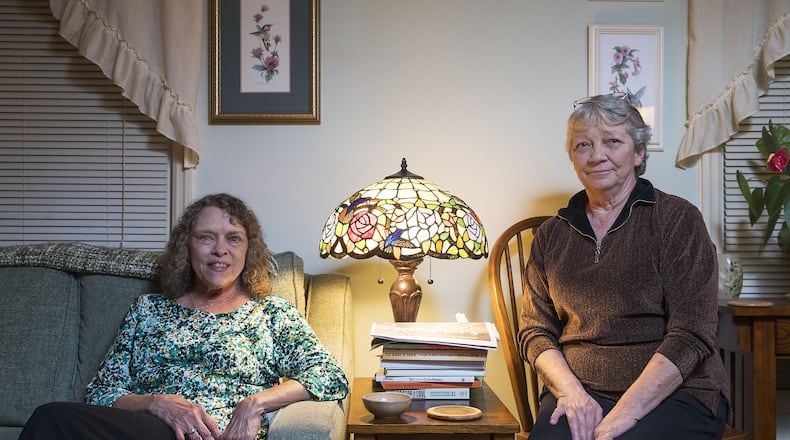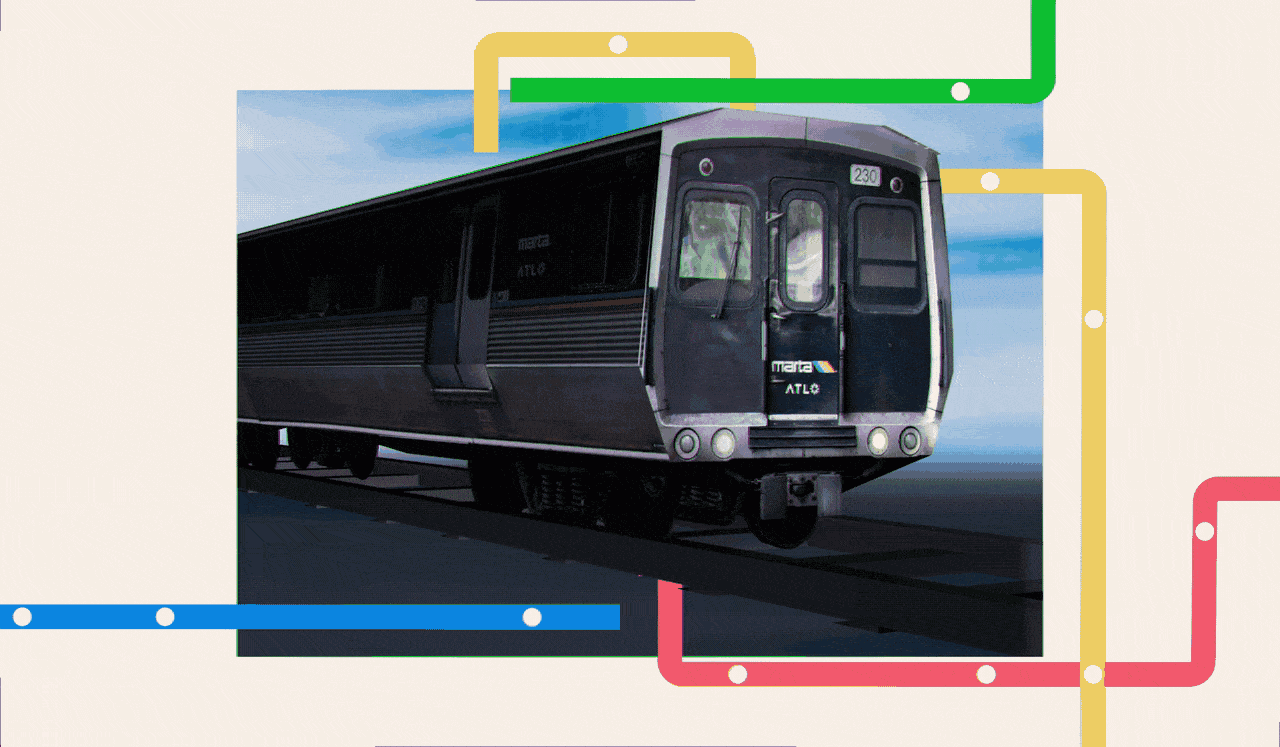Beth Hogan and Debbie Aschemeier are both in their early 60s, divorced and working in the medical field. They both love gardening. And they love living in the small town of Mableton.
Strangers until recently, they’re now roommates and close friends — for reasons both social and financial.
“From the moment we met, we hit it off,” said Hogan. “We’ve never had a fight. I can’t think of ever having a disagreement.”
Hogan and Aschemeier are part of a growing number of baby boomers becoming roommates to cut costs, and also for companionship — just like “The Golden Girls” in the old television show. In metro Atlanta, the number of unmarried-partner households of people over 60 years old rose to 6,412 last year, up by 65 percent from a decade earlier, according to the Census Bureau.
And there’s good reason. With both rents and home prices rising faster than average incomes, housing is, in general, becoming less affordable. And affordability often becomes even more of a problem for older people, more likely to have medical expenses and less likely to have a regular paycheck.
If a household spends more than 30 percent of income on rent or mortgage payments each month, experts call it "burdened," that is, not having enough left over for necessities like transportation and medical expenses. A household that needs to spend more than 50 percent is "severely burdened," in danger of having the slightest unexpected expense lead to disaster.
MORE: Atlanta lawyer moves older man out of bug-ridden home, into her heart
Burdened by housing costs
Metro Atlanta ranks 47th out of 933 regions for the highest share of renters who are cost burdened, according to the Joint Center for Housing Studies at Harvard. Nearly half of Atlanta's renters are cost burdened, and nearly half of those pay more than half their income in rent.
And financial stresses can increase with age, since retirement means an end to regular paychecks. Government payments like Social Security are generally modest, and many Americans do not have much in the way of a “nest egg” to live on.
Only 51 percent of metro Atlantans 65 or older say they would be able to immediately pay for a $400 emergency (by cash, check or debit card), according to the Atlanta Regional Commission.
But oddly, it's not always the oldest that are most at risk — thanks to the uneven impact of the Great Recession, according to Jennifer Molinsky, senior research associate at the Joint Center for Housing Studies. People who had retired already were often somewhat insulated from the pain, especially if they had pensions and equity in their homes.
But among those a little younger, millions lost jobs and homes. Many took jobs that paid much less. Many others never again collected a paycheck. For yet others, a divorce or a medical problem could easily throw their financial plans off track.
"People now in their 70s and 80s are in a better position than the next group will be," said Molinsky. "People who are retiring now are less likely to own homes."
Hogan, who is 64, started renting out a room in her house after a divorce about five years ago. At first, Hogan, who works as a hospice nurse, decided to share her home mostly for company and it didn’t make sense to her to live alone in a three-bedroom, two-bathroom house when she had more than enough space to share with someone.
But health problems began to make Hogan miss work, forcing her to get by on her Social Security disability benefits. And that’s when renting out a room became a financial necessity. She’s had a total of five housemates, each staying on average between a year or two; some worked out better than others. Even so, she said renting out a room has been a “life saver for me.”
These days, she must get by on $1,944 in Social Security each month. She has a mortgage, insurance, property taxes, food and other expenses. She charges $650 a month for a rented room, which includes the utilities. The extra income has helped not only pay the bills for her brick ranch, but cover costs to upgrade the house, including adding a year-round sunroom and a deck on the back of the house.
A need for solutions
Nearly 400,000 households in metro Atlanta are headed by someone age 65 and older. About 130,000 of them are cost burdened by housing costs, according to the center's study. But there is a younger group — ages 50 to 64 — that is larger. Among that group, 167,600 households are burdened.
The trend is troublesome, Molinsky said.
"I definitely think that unless we do something, there will be a lot more older adults who have housing trouble in the future," she said. "It suggests to us that there is going to be a lot more need for affordable housing."
The 65-plus population in metro Atlanta is expected to double to 1.2 million by 2040, according to the Atlanta Regional Commission.
Hogan quickly realized the benefits of renting out a room went far beyond economics. Hogan is formulating a plan to create an eventual “Golden Girls/Golden Guys shared-housing model.” Her plan includes expanding her house to take in more roommates, growing fresh produce on-site, and purchasing other groceries cooperatively.
Meanwhile, Aschemeier, who is 63, said she didn’t realize just how much she was missing out on companionship until she moved in with Hogan.
“I don’t have time and am not looking for a relationship. It’s not that I was lonely and was unhappy by myself, but when I was in my last apartment, I would talk to my cat,” Aschemeier said. “I never realized just how much it would mean having a friend, having someone to ask you how your day was. Talking to your cat is different.”
Paying bills, making friends
Homesharing is an issue explored in a new podcast series that examines how metro Atlanta is growing and changing. (Read below for more information about the podcast and online platform called "What's Next ATL.")
"If you look at the changing demographics, and the rapidly growing aging population, especially those without spouses and other relatives living with them, this presents an opportunity that will be more and more appealing to people who may not want to live alone, or who may not afford to live alone," said Becky Kurtz, manager of the ARC's Aging & Independence Services Group.
Of course, homesharing is not for everyone. It’s not a good fit for people who like to live alone and prefer their own space.
But a huge benefit of sharing a house, Kurtz said, is helping fight social isolation.
“Social isolation is a serious health risk,” she said.
While Hogan has been periodically out of work and on disability, Aschemeier works a 9-to-5 job as a coordinator for a health care staffing company. Hogan enjoys cooking — full dinners of turkey, potatoes and dressing. Aschemeier enjoys the home-cooked meals.
“She likes to cook, I like to eat,” jokes Aschemeier.
Sometimes the two chat in a sunroom full of peace lilies and other plants, or they may watch a movie together. Other times, Aschemeier may retreat in her room for some quiet alone time. Whatever the case may be — it works beautifully.
Aschemeier moved into Hogan’s house after problems with noisy neighbors. Aschemeier happened to be renting a place just seven houses away when she spotted a posting online about a room for rent in Hogan’s home. With the house (and room furnished), Aschemeier sold and gave away almost everything she owns. She kept special memorabilia: a cookbook in the family for generations, a rocking chair, and a sewing table.
After a while living together, Hogan was so struck by their compatibility that she insisted Aschemeier take a Myers-Briggs personality test. The result? An exact match — an ENFP personality, often associated with people who are independent, energetic and compassionate.
Of course, they don’t see eye to eye on everything. Hogan hosts singles meet-and-greets. Aschemeier is not interested in dating.
Aschemeier keeps up with politics more closely.
“I follow politics,” said Aschemeier. “She and I differ a little bit. We agree to disagree. And she is a great woman, and I absolutely adore her. We got lucky.”
They are searching for a third roommate — followed by a possible fourth after Hogan completes a renovation of the basement.
» MORE: How art made this Atlanta senior community feel more like home
THE AGING OF METRO ATLANTA
- Total number of households: 2,062,000
- Number of households aged 50-64: 597,900
- Number of households, aged 65-79: 321,300
- Number of households, aged 80 plus: 78,300
Note: Figures based on head of household. Source: The Joint Center for Housing Studies of Harvard University
IS HOMESHARING FOR YOU?
You may think homesharing sounds interesting, but is it for you?
The National Shared Housing Resource Center recommends examining past living arrangements. You may want to list on paper all of your homesharing experiences and review them in your mind to evaluate what was good and bad.
Ask yourself the following questions:
- Am I sensitive to other people?
- Am I "reasonably accepting" of other people's personalities, moods and preferences?
- Do I listen to and understand other people, especially when there's a difference of opinion?
- Am I able to confront problems and find workable solutions?
- Am I willing to compromise and be flexible?
Finding a roommate who is trustworthy, compatible and will pay their bills on time isn’t necessarily easy. Experts recommend turning to your networks, including friends and your faith community, to help find a housemate. Once a housemate is selected, it’s important that you talk about your expectations and set ground rules from the start — such as expectations about kitchen use, household chores, parking and internet use.
For more resources about homesharing, go to the National Shared Housing Resource Center at nationalsharedhousing.org.
ABOUT ‘WHAT’S NEXT ATL’ PODCAST
“What’s Next ATL” is a new initiative from the Atlanta Regional Commission designed to inform and engage the public on key regional issues.
It includes a website, WhatsNextATL.org, that features regional news and insights and a podcast. The podcast is hosted and produced by Kate Sweeney, formerly an NPR reporter for 90.1 WABE and now an ARC staffer.
The Latest
Featured





